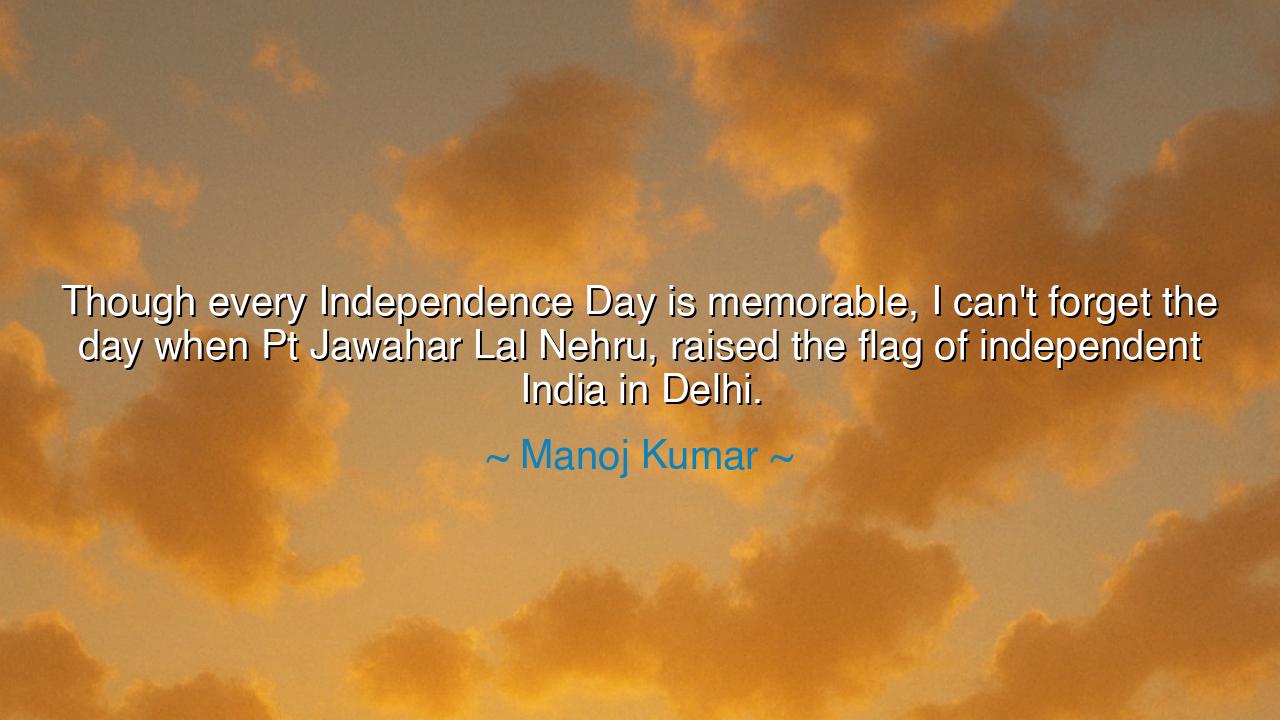
Though every Independence Day is memorable, I can't forget the
Though every Independence Day is memorable, I can't forget the day when Pt Jawahar Lal Nehru, raised the flag of independent India in Delhi.






"Though every Independence Day is memorable, I can't forget the day when Pt Jawahar Lal Nehru, raised the flag of independent India in Delhi." Thus spoke Manoj Kumar, the patriot of Indian cinema, whose art and soul were steeped in love for his motherland. In these words, he evokes not merely a memory, but a sacred vision—the dawn of freedom, the rebirth of a nation long chained by oppression. His voice carries the echo of that glorious morning of August 15, 1947, when the tricolor rose above the Red Fort, shimmering in the light of a new destiny. For him, and for countless others, that sight was not just an event in history—it was a spiritual awakening, the moment when centuries of suffering were transfigured into hope.
The origin of this quote lies in the deep patriotic heart of Manoj Kumar, an artist who devoted his life to celebrating the spirit of India. Known for his films that stirred national pride—such as Upkar and Purab Aur Paschim—he spoke often of freedom not as an abstract concept, but as a living emotion. His remembrance of Pandit Jawaharlal Nehru raising the flag is not the recollection of a mere witness; it is the memory of a child who saw his nation rise like a phoenix from the ashes of colonial rule. In that moment, Nehru’s act was not just political—it was symbolic of India’s soul reclaiming itself. The fluttering flag became a heartbeat, and each color told a story: courage, peace, and faith reborn after darkness.
To truly grasp the depth of this memory, one must imagine the centuries of struggle that led to that day. For generations, India’s people had endured subjugation, famine, and injustice, yet never lost their faith in the dawn to come. The sound of Nehru’s words—“At the stroke of the midnight hour, when the world sleeps, India will awake to life and freedom”—still trembles in the nation’s consciousness. When the flag rose, it was as though the entire land breathed again. Farmers, laborers, scholars, and warriors—all who had sacrificed for liberty—were there in spirit. The air itself seemed to hum with the cry of “Vande Mataram,” as if the soil had found its voice at last.
In the memory of Manoj Kumar, that image of Nehru standing upon the Red Fort’s rampart was not only the vision of a leader, but the embodiment of unity. It was as though all of India’s faiths, languages, and histories had gathered in that single act. The flag, once forbidden, now waved freely, declaring to the world that India had risen—not through conquest, but through endurance and moral strength. It was not a victory of one man or one movement, but of millions who had lived and died for the same dream. To forget such a moment, as Kumar says, would be to forget the very pulse of one’s nationhood.
And indeed, this truth extends beyond India. Every nation that has ever broken its chains knows this sacred hour—the first breath of freedom, the first sunrise after long captivity. Whether it was the American Revolution, the French uprising, or the South African liberation, every people’s Independence Day carries the same divine spark. Yet what makes the first moment unforgettable is not its ceremony, but its sacrifice. The flag that rises does so upon the graves of heroes, the tears of mothers, and the courage of the unknown. That is why Manoj Kumar speaks with such reverence; he sees in Nehru’s gesture the summation of countless lives devoted to a single cause.
From his words, we draw a lesson both historical and personal. For every generation, independence is not only inherited—it must be protected and renewed. Freedom is not the absence of chains, but the constant effort to remain worthy of it. The nation that forgets its struggles becomes complacent; the people who forget their heroes grow rootless. As Manoj Kumar could not forget Nehru’s flag, so must we never forget the ideals it represents: courage, unity, and compassion. For the flag is not cloth—it is a reminder of duty, whispering to each citizen, “Live not for yourself alone, but for the greater good.”
So, my children of liberty and remembrance, take this truth into your hearts: freedom must be remembered to remain alive. Let each Independence Day be not a festival of comfort, but a renewal of resolve. Stand tall beneath your nation’s flag and remember that it once rose from struggle and sacrifice. Let it inspire you to build, to heal, and to uplift, as Nehru did, as countless nameless heroes did before you.
For as Manoj Kumar declared, “Though every Independence Day is memorable, I can’t forget the day when Pt Jawaharlal Nehru raised the flag of independent India in Delhi.” Let that day live within you—not as history, but as heartbeat. For when we remember the first dawn of freedom, we keep its light burning for generations yet to come.






AAdministratorAdministrator
Welcome, honored guests. Please leave a comment, we will respond soon